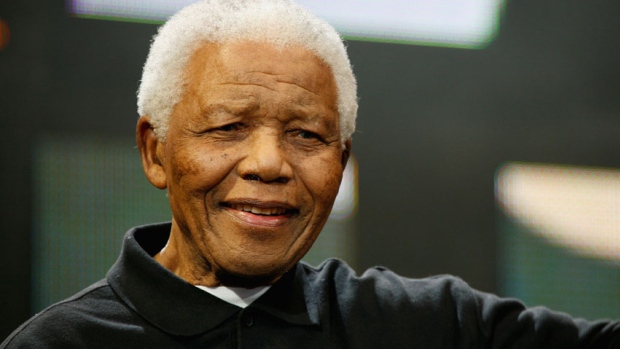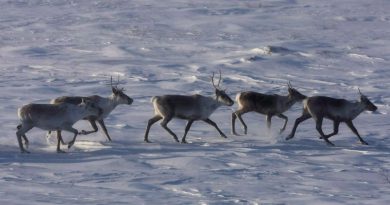Canadian Inuit leaders, northerners remember Mandela

Canadian Inuit leaders are remembering Nelson Mandela today, saying his battles against racism, inequality and poverty had deep meaning among Inuit.
The anti-apartheid activist was released from prison in South Africa in February 1990. He began travelling through Europe and North America and on July 1, 1990 his plane stopped in Iqaluit to refuel while en route to Ottawa from Ireland. Residents of Iqaluit turned out in the middle of the night to catch a glimpse of him.
On Twitter, Nunavut MP Leona Aglukkaq wrote “The world has suffered a great loss. Nelson Mandela was a visionary leader and inspiration to all.”
In a news release, Terry Audla, president of Inuit Tapiriit Kanatami, said Mandela taught people to stand up for their rights.
“Perhaps just as importantly, he taught us the true meaning of forgiveness. His lessons on reconciliation have been an inspiration to Inuit during our own process of truth and reconciliation,” said Audla.
Remembered for passion and commitment
Cathy Towtongie, President of Nunavut Tunngavik Incorporated, thanked Mandela for his passion and commitment.
“Mandela’s lifelong struggle to achieve equality has resonated with oppressed peoples around the world for so many years. His work began in a time when it was dangerous to rebel against apartheid, when fighting the oppressor was truly life threatening. His unwavering courage has inspired so many people, including many Inuit,” said Towtongie.
In December 2000, Mandela met with Inuit representatives in Johannesburg, South Africa, during intergovernmental negotiations on a global convention to eliminate persistent organic pollutants.
“He modelled such integrity, strength, and resilience in the face of such public persecution for his leadership in the apartheid movement,” said Sheila Watt-Cloutier, president of the Inuit Circumpolar Conference Canada at the time.
“When he came out of prison, his calm, wise and inclusive leadership style resonated with Inuit as our own culture reveres the same attributes in our elders.”
Northerners remember Nelson Mandela
M.S. Naidoo remembers his encounter with Nelson Mandela.
Naidoo, a retired educator in Canada’s Northwest Territories, saw him in person speaking at a conference in South Africa.
“My hairs just bristled on my arms. I couldn’t believe I was seeing this person walking through this crowd.”
Naidoo grew up in South Africa and lived in segregation because of his Indian background.
He says he has always looked towards Mandela for inspiration.
The former president of South Africa, Nelson Mandela fought to end apartheid in his country, both before and after spending 27 years in prison for his beliefs.
Marie Wilson is a commissioner with the Truth and Reconciliation commission of Canada.
She trained journalists in South Africa in the 1990s as that country was making the transition to democracy.
She says black South Africans and Aboriginal people in the North have both experienced a form of colonialism.
“It took the engagement of a wider society. In the case of the North, it took people to engage from Southern Canada, to engage and debate about land rights and northern rights. In the case of South Africa, it took the whole world to engage in discussion about the wrongness of apartheid.”
Wilson was in South Africa around the time its Truth and Reconciliation process was starting to grapple with the legacy of apartheid, and the violence and oppression that accompanied it.
Dene elder Francois Paulette says Mandela taught him about discipline and compassion.
“It’s something that I’ve been working on,” Paulette says. “To have compassion towards people that hurt you, and that are harming mother Earth.
“To have compassion, that’s extraordinary, and this man Mandela had this. He was gifted to have that. It must have resonated all over the world, because people have travelled the world to come and visit him.”
Related Link:
Nelson Mandela dead at 95, CBC News



